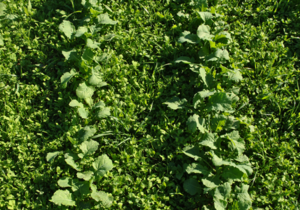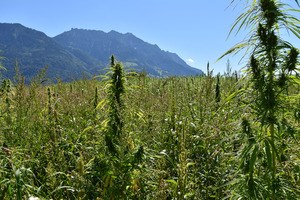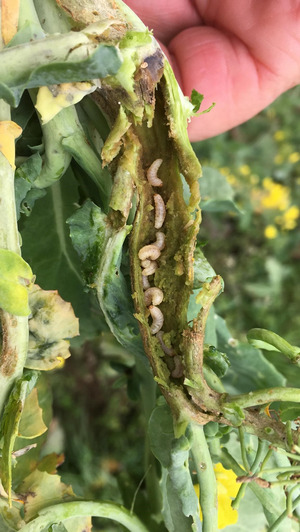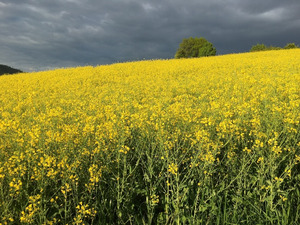Case study 6: Switzerland: Developing organic oilseed production with oilseed rape and hemp
Cluster 2: Crop diversification under adverse conditions
Swiss organic crop rotations could be diversified by increasing the share of oil crops in the rotation. However, it is challenging to cultivate oil crops organically, and production costs are very high in Switzerland. In order to improve the economic situation for farmers, this case study intends to make the production more stable and efficient. Direct markets are also developed to bypass main retailers.
What were the main problems underlying the emergence of the case study?
The production risk for organic oilseed rape is high. There is a high chance of severe yield loss due to the high occurrence of pests like pollen beetles or weevils, the strong weed pressure as well as the limited nitrogen supply. As a result, domestic prices for organically produced oil are quite high compared to imported organic oil. This has led to major problems in sales.
An important retailer in Switzerland has abandoned the sale of Swiss organic oilseed rape (certified with the “bud” label of Bio Suisse, the association of Swiss organic farmers). They would be interested in Swiss organic oilseed rape but only if the price could be lowered. Furthermore, the two main Swiss retailers are only partially interested in other oils since they already have a very wide range of oils on their shelves. There is potential to further develop the production of hemp but only for direct sale.
How was the problem addressed and which actors were involved?
Field trials at FiBL and Agroscope (Swiss agricultural research institute) have been performed to control pollen beetles with stone meal or an olfactory distraction technique. Service crops are also tested with the aim to better control weeds and reduce production costs accordingly. The experiences from the last three years have shown that service crops in organic farming were less effective than in conventional farming. In organic farming, there is a higher risk of competition for nutrients, light and water. We concluded that undersowing techniques in organic rape production are neither agronomically nor economically worthwhile.
Achieving a cheaper way of cultivating organic oilseed rape may convince one of the main Swiss retailers (accounting for around 40 % of the sales) to restart selling Swiss organic oilseed rape. Since it was found that undersowing techniques are not promising, we tested intercropping with oilseed rape and cereals or grain legumes in 2021, with the idea of at least partly compensating the economic risk of oilseed rape production in cereals.
The cultivation of hemp is quite new and promoted by various organic farmers. There are numerous informal initiatives where the technical advisory support is lacking or insufficient. Biofarm (a Swiss organic farmer and trade cooperation), FiBL as well as the collector and processor “AlpenPionier” are working together to develop the production of hemp in Switzerland. Undersowing techniques are being tested on hemp in order to analyse their effect on weed pressure.
Solution investigated
More investigation is needed to further develop the production of oilseed rape and hemp. The implementation of testing to better control pests and/or compensate their economic consequences (for instance with intercropping techniques involving two main crops on the same field) is of particular importance. The FiBL arable farming group continues to test various service crops (on-farm) in oilseed rape and hemp. Catch crops provide good and fast coverage, compete against weeds and may also reduce pests. Value chain actors including the producers are getting more connected to each other by means of personal contacts with researchers, advisers, and processors, and also thanks to events like field visits. The case study team also supports the development of a direct market in order to increase the production of oil crops and to diversify organic rotations accordingly.
Expected outcome
Establishing and expanding organic oilseed rape production for food and the industry sector in Switzerland.
Finding new methods to stabilize the yield of organic oilseed rape and/or to compensate the economic risk of producing oilseed rape.
Establishing new organic oil crops like hemp to diversify crop rotations.
Developing the market for direct sale of oil crops like hemp.
Developing the technical knowledge on hemp and on intercropping techniques with rape and cereals.
Exchanging knowledge with other project partners.
Relevance to the DiverIMPACTS goals?
This case study is contributing to a more diversified agricultural landscape with a lower impact on the environment and the production of ecosystem services. The environmental benefits come from a lower use of inputs in such systems. Furthermore, the different implemented techniques in organic agriculture can inspire the conventional sector and lead to more positive impacts overall. Finally, the organic oilseed rape and hemp markets are being developed by diversifying the range of possible outlets (direct sale). Of particular interest is the development of the production of high oleic oilseed rape, supporting farmers’ incomes.
Case study legacy
Field trials on rape and hemp will be maintained to the extent possible. In particular, trials on hemp and under sowing techniques in collaboration with Bio Suisse will continue in the frame of a separate project. A project that was developed in synergy with DiverIMPACT will continue some of the work done in the case study. It is a collaboration with the Swiss research institute Agroscope on the role of different varieties of rape to control insects. In addition, organic associations like Biofarm are expected to maintain their own efforts to find new agronomic solutions and increase Swiss oil production. The collaboration with key value chain actors, including Pflanzenoel and AlpenPionier, will be maintained to the extent possible with the aim of maintaining or developing alternative markets and therefore of Swiss oil production.
Further information
Links
- zenodo.org: Practice abstract “Avoiding hoeing in organic oilseed rape"
- youtube.com: Anbau von Raps und Bekämpfung Rapsglanzkäfer (Juni 2016)
Case study team
- Hansueli Dierauer, FiBL, case study leader
- Sylvain Quiédeville, FiBL, case study monitor




 tap and then scroll down to the Add to Home Screen command.
tap and then scroll down to the Add to Home Screen command.